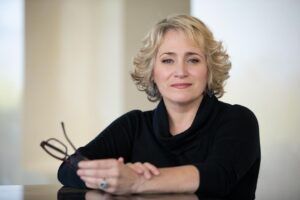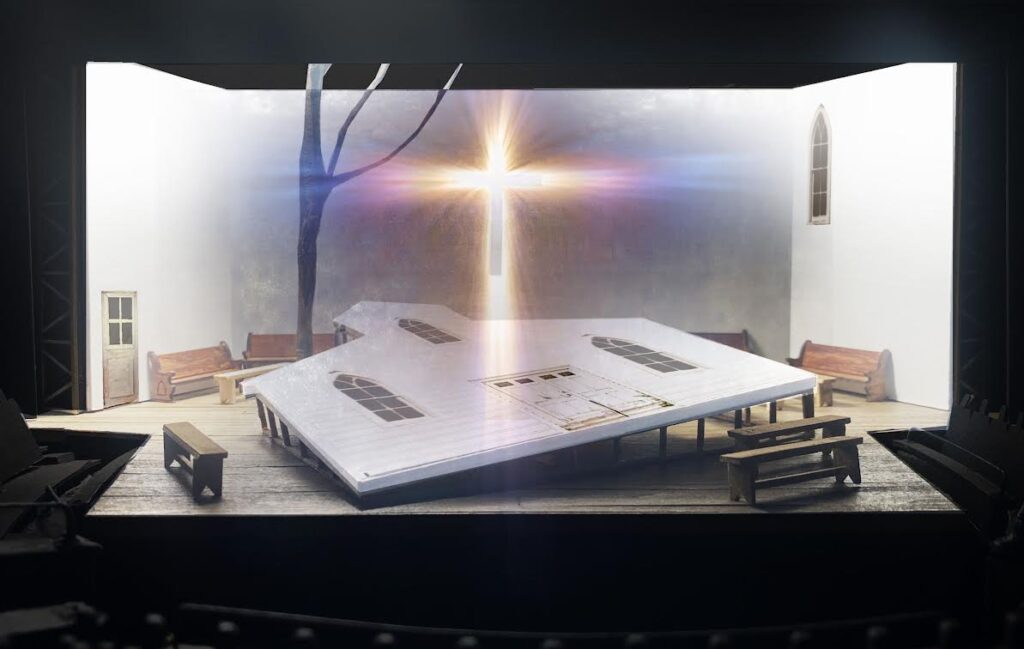
Q & A: Patricia Racette on Her Journey as a Director & ‘Susannah’ at OTSL
By David Salazar“Racette, almost continually on stage, commands our attention with seeming effortlessness.”
“Racette was the shining center of it all…”
“Racette’s impressive depiction of Susannah drew on the very qualities that have made so many of her performances here invaluable over the years…”
These are just a few of the many reviews praising internationally renowned soprano Patricia Racette’s turn in the title role of Carlisle Floyd’s “Susannah.” In fact, many would argue that her interpretation from the 2014 run is arguably the most iconic and essential in the modern history of the American operatic classic.
But now, Racette will provide a unique interpretational spin on the work behind the scenes as she directs the work at the Opera Theatre of Saint Louis this summer.
This production represents a return to the company that launched this phase of her career. Back in 2018, Racette mounted a production of “La Traviata” with the company and since then she has directed the Scenes Program for the Ryan Center at the Lyric Opera of Chicago.
OperaWire had an opportunity to speak with Racette about her upcoming production of “Susannah” which premieres on June 10, 2023 with a cast starring Janai Brugger in the title role.
OperaWire: You have been directing numerous projects with Opera Theatre of Saint Louis over the last few years. How as that relationship developed?
Patricia Racette: My affiliation with OTSL has been one of the most satisfying professional experiences of my 35 years in this profession. As Artistic Director of Young Artist Programs, I welcome the mission of fostering tomorrow’s young talents with group and one-to-one work on vocal, musical, linguistic, and interpretive style, as well as overseeing their stage responsibilities for each season. I am excited to have elevated our Center Stage concert [which exclusively features our young artists towards the end of the season] by featuring them in a semi-staged format of operatic and musical theater excerpts, as opposed to the previous more traditional concert experience. In my view, teaching our young artists about the totality of disciplines that make up this complex and opulent art form is the purpose of a training program.
My goal as a director is essentially the same. Interpretively speaking, this process of integrating vocalism with theatricality and stylistic polish is one that I also incorporate in my directorial role when working with mainstage artists. And as a director, I also have the added opportunity of more stage time with my young artists who are cast in supporting roles as well as in the chorus. It’s all about “boots on the ground,” in terms of gaining as much experience as possible!
OW: What is your process for directing an opera and preparing a new production?
PR: My first step always begins with research: what is the source material and why did the composer decide to tell this story? I then immerse myself in the score — it’s like getting into a zone of sorts. I literally find that during this listening process, the timing of the narrative organically evolves for me. The score provides a tangible blueprint that will ultimately house interpretive ideas and theatrical narrative, but it also gives way to my vision for what the storytelling will look like and feel like.
I really do not struggle with the “Capriccio Question” of words vs. text! I fully embrace the integration of the text as it is set to music, and likewise, I love the purely musical elements in overtures, preludes, interludes — as all of these aspects inform how to visually articulate the collision of the story.
Finally, I work out my own blueprint for the staging. This process is fluid and flexible as I wish for my cast to have room to bring their own ideas to the process. I make suggestions and offer options, but in the end, I wish for it all to be siphoned through one funnel so that the finished product exists within a similar palate.
OW: How has your experience as a performer informed you as a director?
A. The fact that I have “walked the walk” and lived most of my life onstage means that I relish the opportunity to be in control of the entire narrative of the piece, rather than just the journey of a single character. Perhaps more importantly, my performing experience also means I can offer an intimate knowledge of the score and thus the timing of that narrative. There is no substitute for the experiential component. As a singer, I have worked with hundreds of designers, conductors, and directors, which has given me a front-row seat to how the “sausage is made” from many perspectives! I have always believed in being a collaborative performer and participant — now I get to steer the conversation!
OW: You were renowned for your portrayal of Susannah. Now you are taking it on as a director. How has your interpretation of the opera changed over the years?
PR: As a director, my job is to draw out the individual performances from the artists in my cast. Yes, I have my own ideas of how I would portray any given moment, and I do often demonstrate, but I do so as an invitation to the artists to stretch and challenge themselves — and challenge me, too! I believe the most potent realization of this art form comes with the collision and collaboration of ideas in order to achieve artistic and interpretive ownership. Carlisle Floyd himself gave the stage direction that Susannah is set in the “present day,” which in and of itself gives way to an ever-evolving landscape — politically, socially, culturally.

OW: What themes will your Saint Louis production of Susannah spotlight and how will you express those on stage?
PR: We are making use of projections in this production to expand the landscape — literally and figuratively. Our space is anchored by certain scenic elements: the ever-present tree, the church, and the cross — elements that are derived both from the original inspiration of the story as well as from the story within the opera that Carlisle created. As expressed above, Carlisle directs that the story takes place in “the present day.” The themes of mob mentality and religious weaponization apply then and apply now, although I am choosing to suggest a time period of the early 1990s to highlight a
time just prior to our absolute dependence and connection to the digital world and our personal devices.
OW: For this production, Janai Brugger will take on the title role. What excites you most about working with her on this role?
PR: In addition to being a sublime singer, she brings an honesty and authenticity to her work which is so compelling. I love taking time to explore this character with her to define her interpretive approach. What impresses me beyond her sheer vocal beauty and innate intelligence is her malleability and willingness to dig deeply into the character.
OW: What are some other operas that you would like to direct in the future and why?
PR: La Fille du Régiment — I would love to direct something with humor because I actually have a great sense of humor and have spent the lion’s share of my career playing tragic heroines!
Peter Grimes — I am drawn to the deep psychological fabric of that community and its wonderfully rich theatrical palate, which actually parallels Susannah’s themes of community mindset, intolerance, and suspicion. I would also add “The Turn of the Screw” to the Britten wishlist — another psychological thriller!
Tosca — I ADORE this score and am drawn to this Puccini heroine more than others that I have portrayed. Her fire, her passion is most akin to my own personality. The music perfectly articulates the emotional tensions that build through the story.
Roméo et Juliette — I relish the opportunity to take timeless classics and bring them to the foreground of our current sensibilities as a culture.
Others that come to mind: “Dido and Aeneas,” “Agrippina”… and perhaps other Handelian ventures. You may note that some of the titles on my wishlist are operas that I have NOT performed, which excites me in terms of really delving into scores that I want to experience through the directorial lens as I continue to discover my own range on this side of the stage!


